Congratulations. Pregnancy is an exciting time, creating life and watching your baby grow is truly amazing. If this is your first pregnancy you probably have a lot of questions about what to eat. Everyone has an opinion on what you should and shouldn’t eat. It can be pretty confusing. There is no special diet for pregnant women, a diet that is well planned including vegetarian and vegan are appropriate for pregnancy. However, there are a few nutrients all pregnant women need to mindful of. We will discuss each nutrient separately. The basic healthy eating principles are the same … eat plenty of vegetables (especially green), fruit, whole grains, healthy fats and lean protein. This may be difficult in the first trimester when fatigue and hormones are wrecking havoc on your body but try your best. Research suggests what we eat during pregnancy not only affects their growth and development in utero but can also affect their eating behaviours later in life. In the first of our two part series we are going to talk about what to eat during pregnancy to keep you and your baby healthy.

photo credit Rhonda Dent Photography
Protein
Protein is essential for a healthy pregnancy especially in the second and third trimesters where your baby is growing. Good protein sources include greens, eggs, nuts and seeds, legumes, lentils, whole grains, milk and milk products, fish, poultry, and meat. Include a protein rich food at each meal.

Folic Acid
Take a quality prenatal vitamin that contains at least 600 mcg of folic acid. Folic acid is the synthetic form of folate added to supplements and fortified foods. Folate, a B vitamin, plays an important role in preventing neural tube defects such as Spina Bifida and anemia. Food sources of folate include spinach, broccoli, lentils,oranges, as well as fortified breads, pasta and cereals. Talk to your health care provider about prenatal supplements to ensure you are receiving adequate amounts of nutrients.

Omega 3 fatty acids

Omega 3 plays an important role in both baby and mom’s health. Docosahexaenoic acid (DHA) plays a crucial role in the growth and brain development in infants. Walnuts, flaxseeds, and omega 3 eggs are a type of omega 3 fatty acid called alpha Linolenic acid. But long chain fatty acids eicosapentaenioc acid (EPA) and DHA are thought to have more of a role in brain development. Best food sources of EPA and DHA are found in fatty fish. Choose low mercury fatty fish such as salmon, char, trout, sardines, and mackerel. Health Canada suggests 2 servings (300 grams or 5 ounces) of low mercury fish/week. If you are vegetarian or vegan talk to you health care provider about which omega 3 supplement meets your requirements.
Iron
Iron helps your body make hemoglobin, a protein in red blood cells that carries oxygen to tissues. During pregnancy a women’s blood volume expands to support a women’s body changes and help the fetus make its own blood supply. Iron deficiency is common in pregnancy , your health care provider may recommend additional iron.
Iron comes in two forms heme and non heme iron. Heme iron is found in animal products poultry, red meat, and fish. Ours bodies absorb heme iron better than non heme. Non heme iron is found in plants. Plant sources of iron include dark green leafy vegetables, legumes, lentils, tofu, tempeh, grains, as well as nuts and seeds. Non heme iron absorption can be improved when paired with vitamin C rich foods such as bell peppers, strawberries, tomatoes, kiwi, pineapple, and oranges.

Calcium & Vitamin D
Calcium and vitamin D are important for healthy bones and teeth in the fetus. It is especially important in the second and third trimester when bones are teeth development are at their peak. Good calcium food sources include dairy products such as cheese, yogurt, milk, non dairy food sources include broccoli, collard greens, beans, legumes, sesame seeds (tahini), hemp seeds and hemp milk.
Drink plenty of water
Its important to stay hydrated especially during the summer months. Instead of consuming sugary beverages drink water. Not only will water keep you well hydrated but it will also help with some not so nice side effects of pregnancy like constipation.
Prenatal Vitamin and mineral supplement
Take a daily prenatal vitamin and prenatal to ensure you are getting enough key nutrients to keep you and your baby healthy. Talk to a health care professional who specializes in prenatal care to recommend a high quality prenatal supplement that best meets you and your baby’s needs. If you are in the family planning stages it is recommended to take a prenatal vitamin three months prior to conceiving.
Wishing you a happy and healthy pregnancy.

No comments yet.